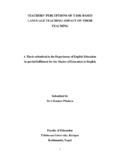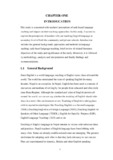Please use this identifier to cite or link to this item:
https://elibrary.tucl.edu.np/handle/123456789/450| Title: | Teachers’ Perceptions of Task-Based Language Teaching: Impact on Their Teaching |
| Authors: | Phulara, Devi Kumari |
| Keywords: | Task-Based;Language Teaching;Teachers’Perceptions |
| Issue Date: | 2012 |
| Publisher: | Central department of English Education |
| Institute Name: | Central Department of Education |
| Level: | Masters |
| Abstract: | The present study entitled “Teachers’ Perceptions of Task-Based Language Teaching: Impact on their teaching” attempts to explore secondary level English teachers’ perceptions of Task-based Language Teaching (TBLT) in Kathmandu District. To accomplish this study, a set of questionnaire was formulated and distributed to 40 secondary level English teachers in Kathmandu District. Half of them were from community schools and rest of them were from the private schools. The data collected from the respondents were analyzed and interpreted to explore their perceptions towards TBLT. The overall findings of the study show that the majority of respondents have a higher level of understanding about TBLT concepts. The findings suggested that teachers generally understand the TBLT approach but it was found that teachers have inadequate knowledge but they think more training would enhance their knowledge of TBLT. The study indicated that the implementation of TBLT would be more successful if schools or government have a more open attitude towards TBLT and teachers have sufficient training. Similarly, changing in assessment methods would help for successful implementation of TBLT in our context. This study consists of four chapters. The first chapter introduces the study in terms of general background, review of related literature, objectives of the study, significance of the study and definitions of the specific terms. Likewise, the second chapter deals with the methodology applied to conduct the study. It consists of the sources of data, population of the study, sampling procedure, research tools for data collection, process of data collection and limitations of the study. Similarly, the third chapter deals with analysis and interpretation of the raw data obtained from the respondents. The data were analyzed and interpreted by using statistical tools and presented with the help of tables etc. Finally, the chapter four deals with the findings, recommendations and pedagogical implications of this study |
| URI: | http://elibrary.tucl.edu.np/handle/123456789/450 |
| Appears in Collections: | English Language Education |
Files in This Item:
| File | Description | Size | Format | |
|---|---|---|---|---|
| cover.pdf | 29.16 kB | Adobe PDF |  View/Open | |
| CHAPTER.pdf | 141.2 kB | Adobe PDF |  View/Open |
Items in DSpace are protected by copyright, with all rights reserved, unless otherwise indicated.
